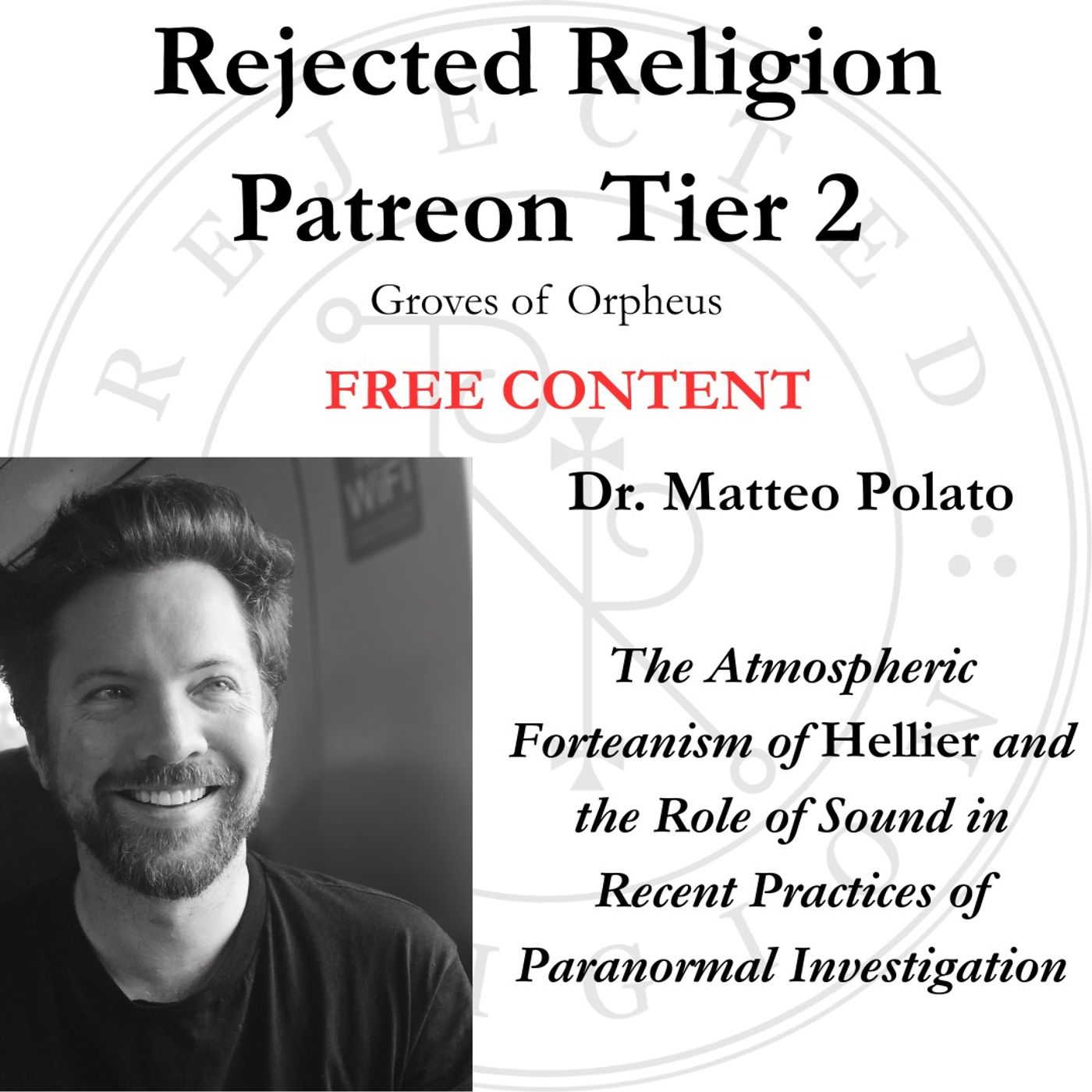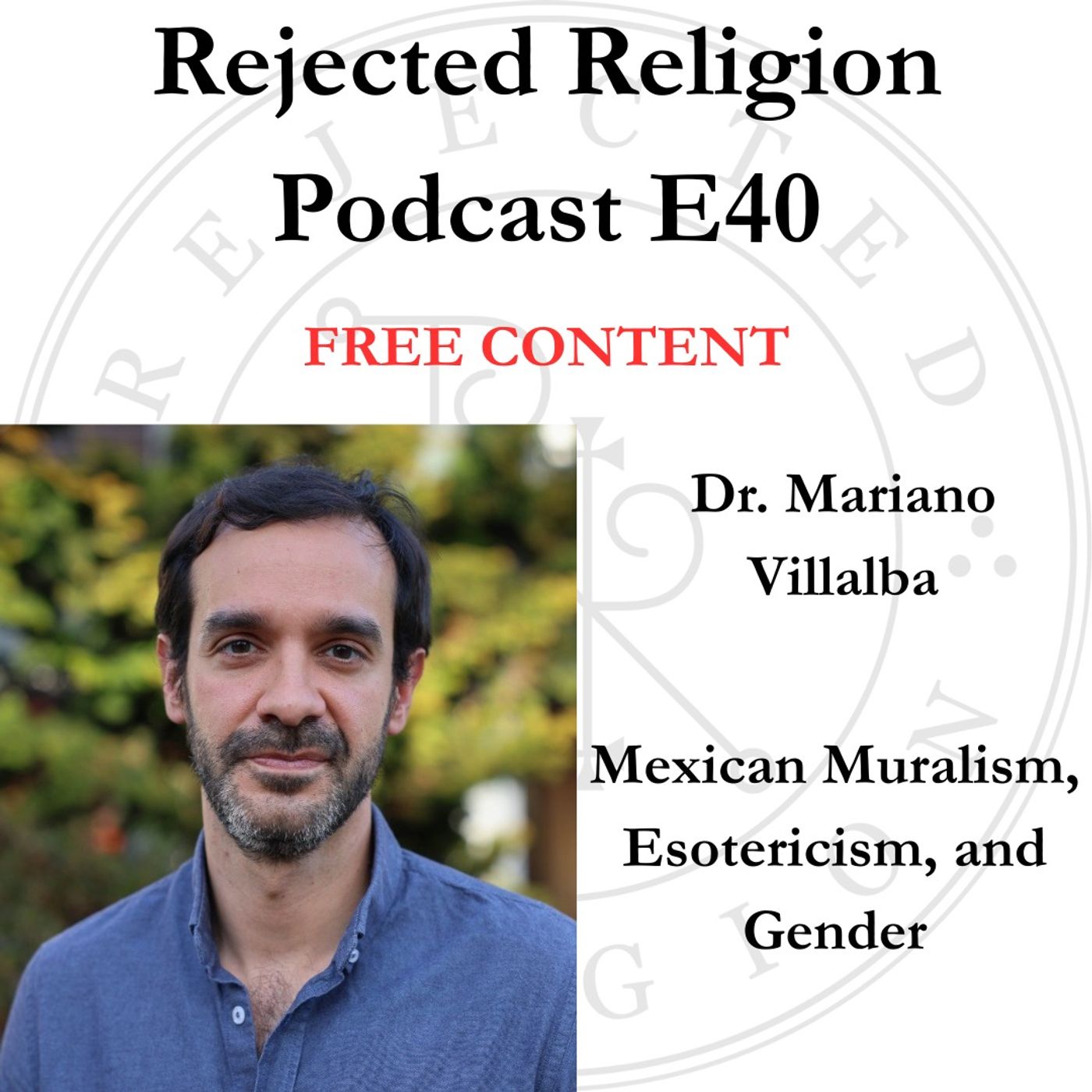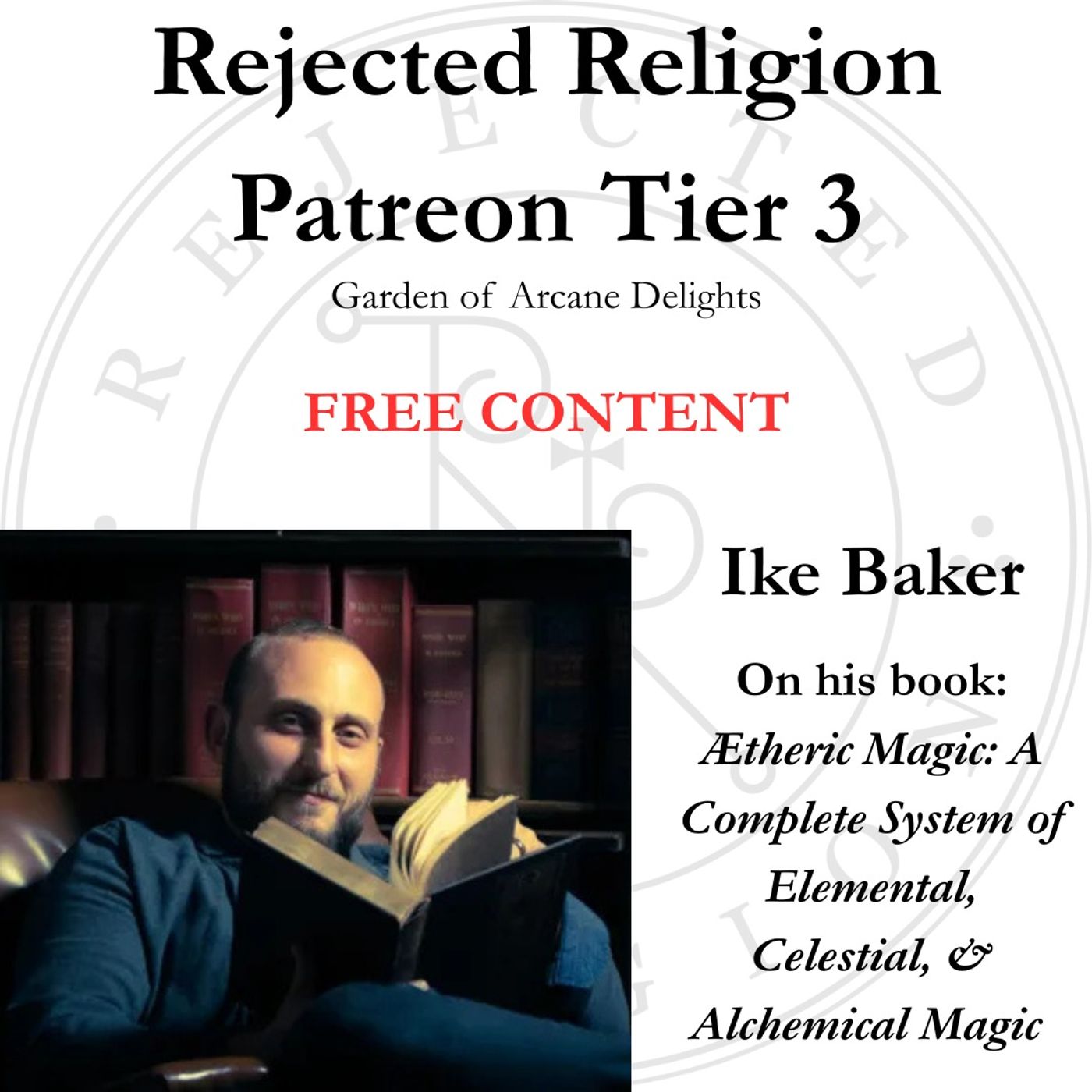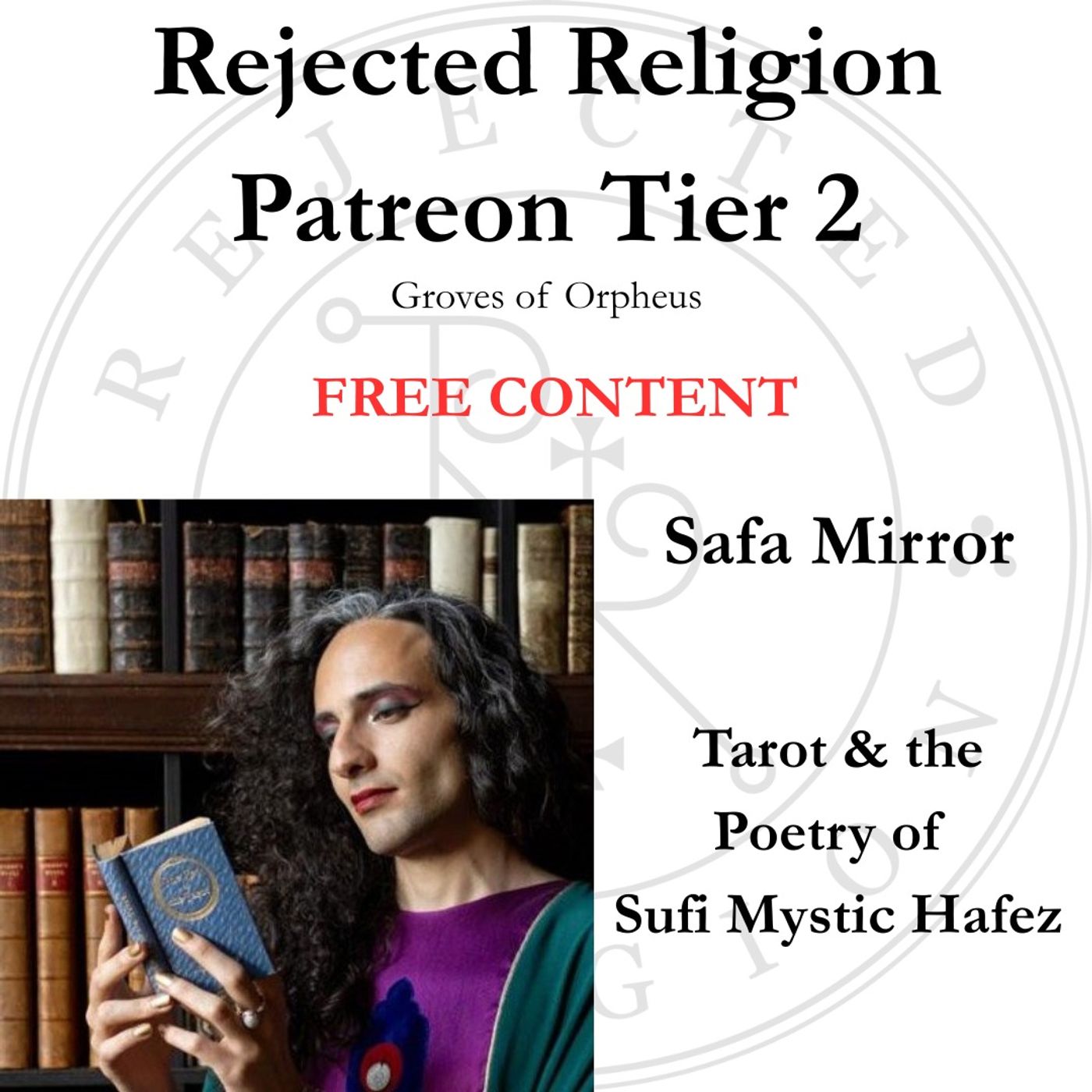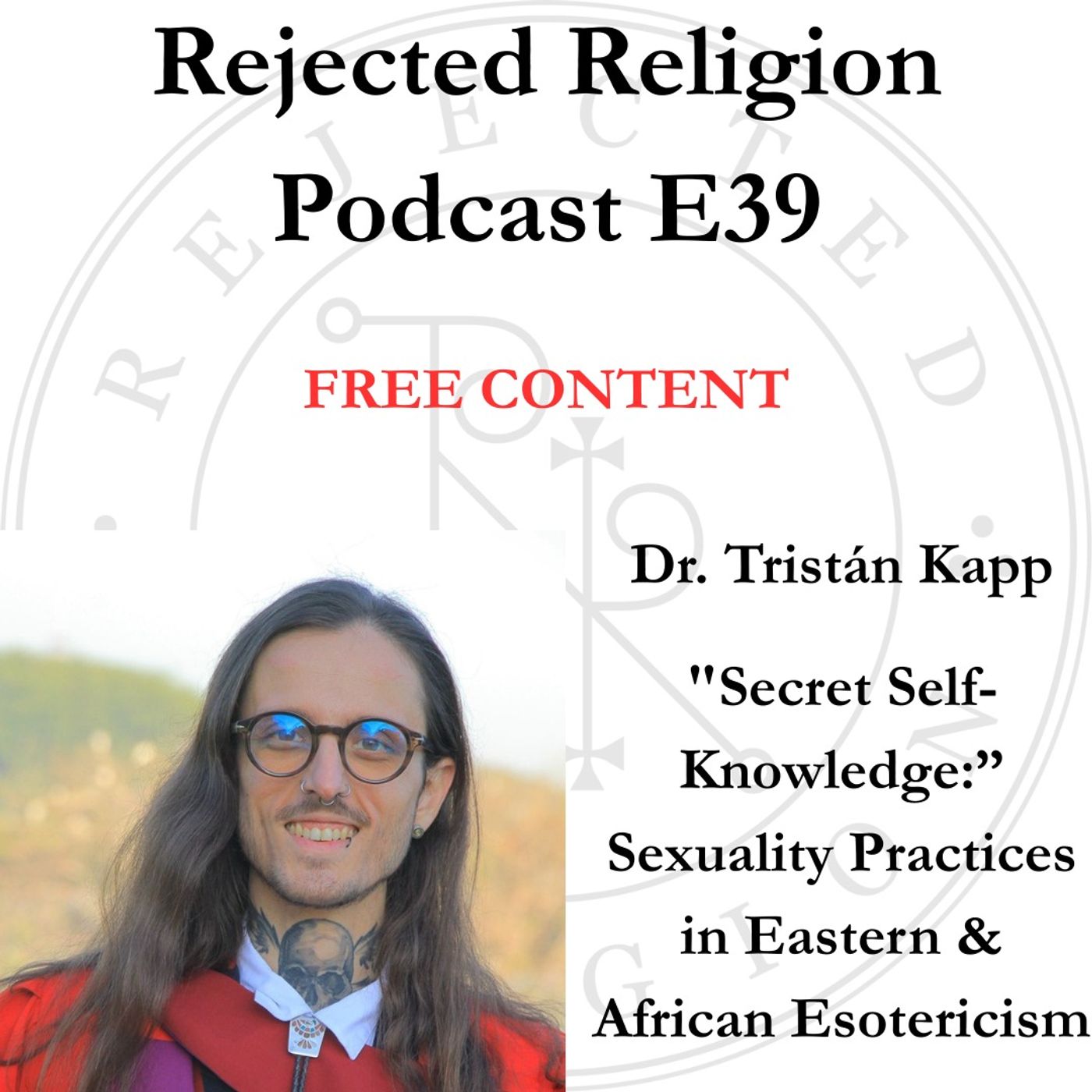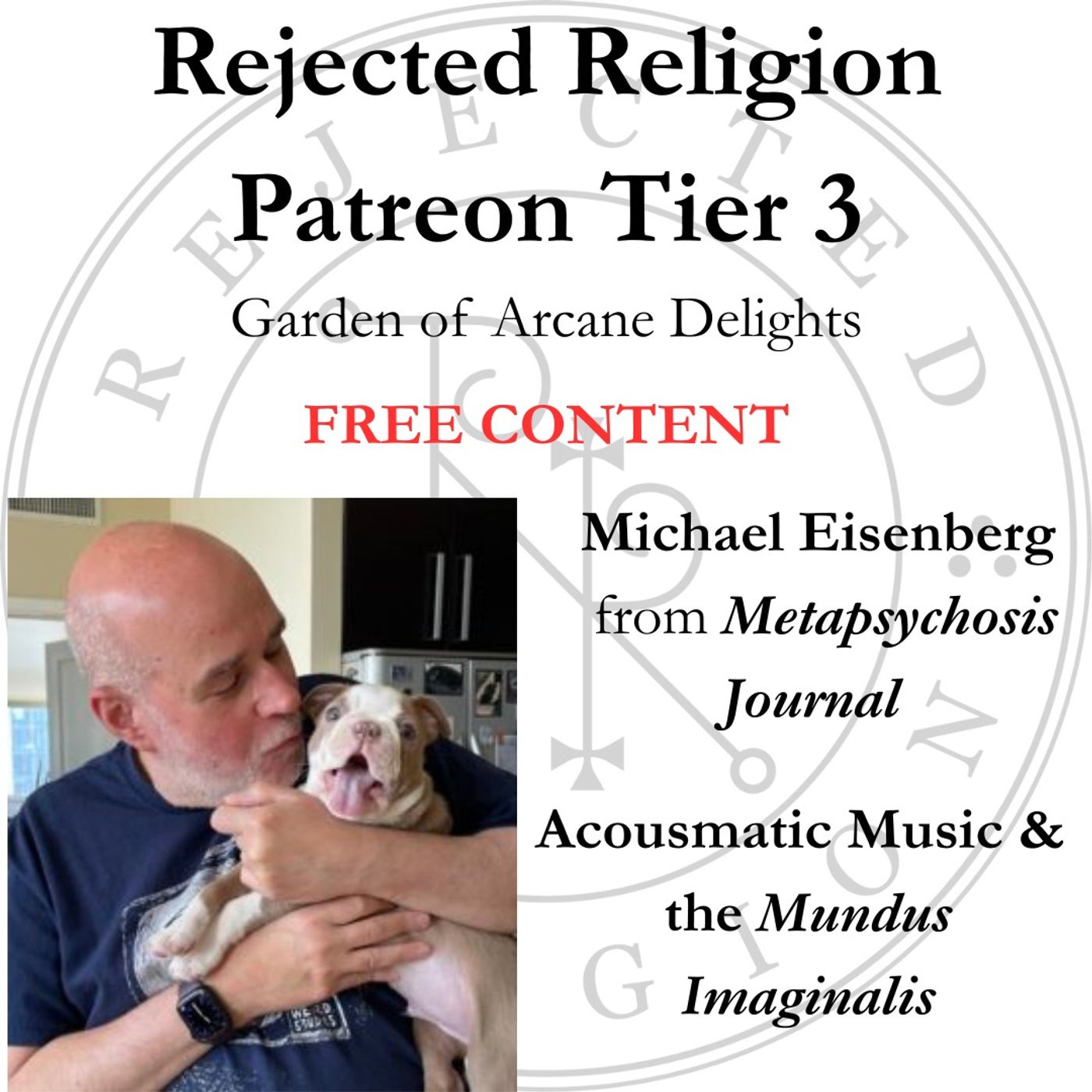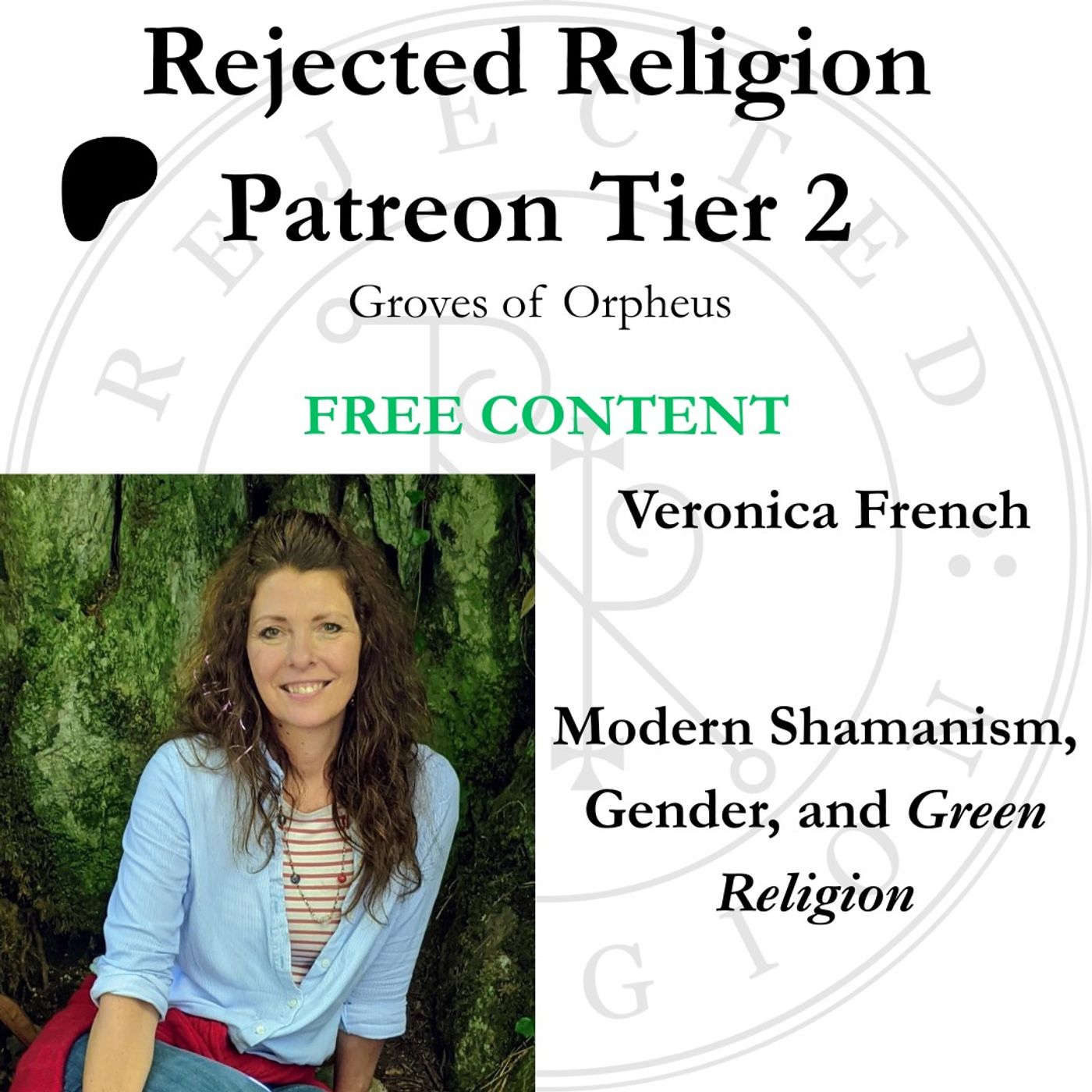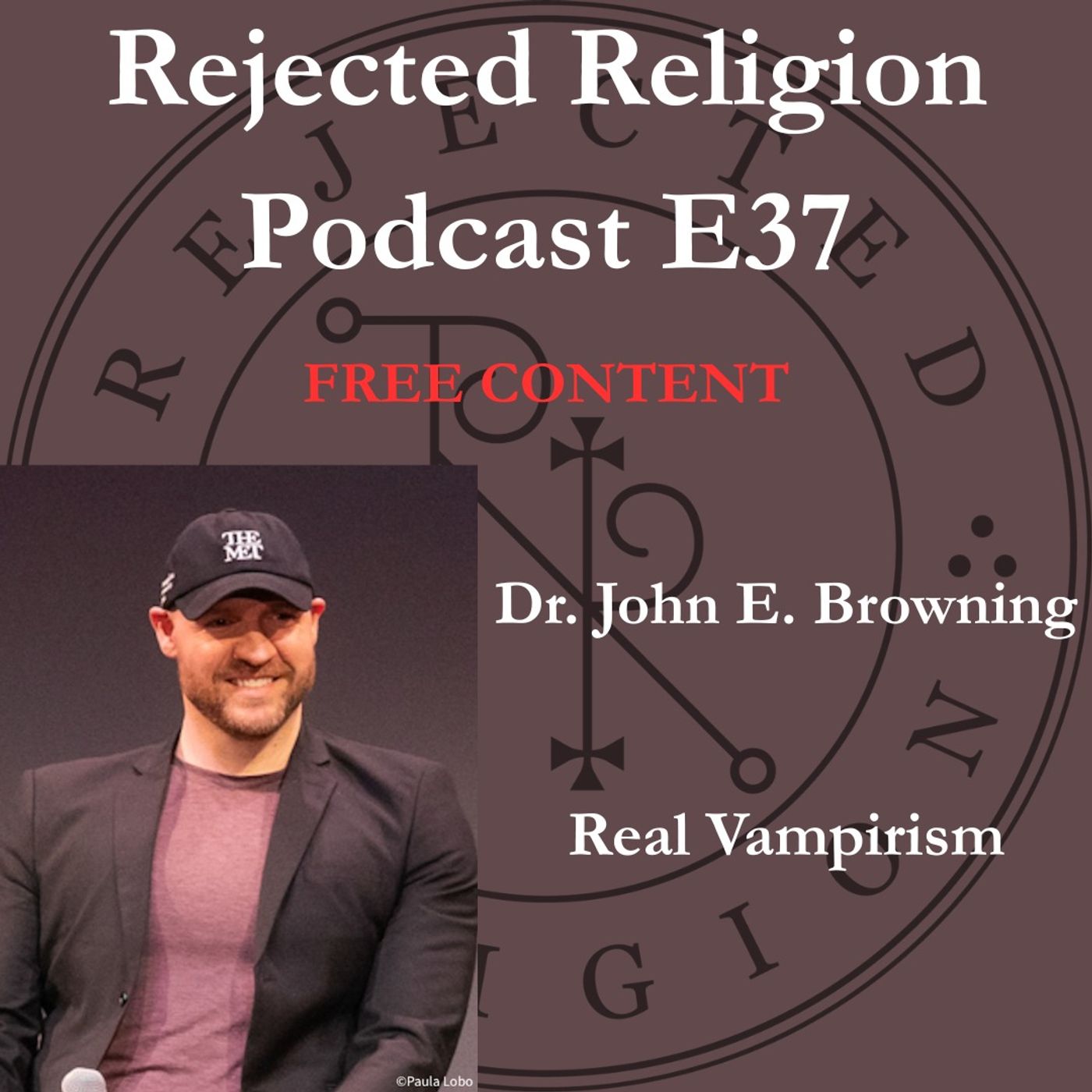Discover Rejected Religion Podcast
Rejected Religion Podcast

114 Episodes
Reverse
*Note: this is the Free Content version of my interview with Bastiaan van Rijn. To hear the entire interview, please consider joining my Patreon and becoming a member; alternately, this episode can be purchased for a one-time fee. More information at www.patreon.com/RejectedReligion.My guest this month is Dr. Bastiaan van Rijn.Bastiaan is a postdoctoral researcher at the University of Fribourg, Switzerland. During his PhD, he has investigated how practitioners of different movements in the nineteenth century tried to scientifically prove life after death exists. The outcome of this project is the book Afterlife Research (forthcoming), as well as several open-access articles. Beside this, he is also interested in playful approaches to religion and divination in the contemporary West. His newest project centers on spiritual tourism.This interview takes us into the fascinating world of Mesmerism—also known as animal magnetism—and its enduring influence on the boundaries between science, mysticism, and spiritual inquiry. Bastiaan gives a brief bio of Franz Anton Mesmer, who in the late 18th century proposed that an invisible fluid flowed through all living beings, capable of healing and revealing hidden truths. Though controversial and dismissed by many, Mesmer’s ideas sparked a lineage of thought that continues to shape contemporary conversations about consciousness, healing, and the legitimacy of scientific inquiry.We discuss how Mesmerism blended science and mysticism, influenced public perception, and laid the groundwork for practices ranging from hypnotism and New Thought to modern-day energetic healing. Bastiaan’s own research picks up this thread, tracing how the experimental impulse to make the invisible visible evolved into afterlife studies, somnambulism, and psychical research.From there, we dive into Bastiaan’s dissertation, which examines the emergence of a “scientific culture” in afterlife research—one grappling with empirical inaccessibility, unreliable intermediaries, and skeptical resistance. Through case studies of three spiritual animal magnetizers, Bastiaan uncovers how different strategies were used to stabilize claims and navigate the tension between belief and method.Ultimately, this conversation invites us to rethink what counts as scientific, Bastiaan invites us to consider not just what these researchers claimed to find, but how they tried to find it, as well as how experimental practices in esoteric and spiritual domains contribute to broader dialogues about religion, and the unseen dimensions of human experience.What emerges is a rich, transhistorical culture of inquiry—one that challenges our assumptions about science, religion, and the boundaries of legitimate knowledge.PROGRAM NOTESFind Bastiaan:Bastiaan Benjamin Van Rijn - University of FribourgBastiaan van Rijn | LinkedInInstagramResearchGate – all research[PhD Diss.] The Experimental Culture of Afterlife Research: Attempts by Spiritual Animal Magnetizers to Prove Life after Death | Request PDF(PDF) Chapter 9 Building a Typology for Intentional Transformative Experiences: Louis- Alphonse Cahagnet’s Experiments with Magnetic Somnambulism and HashishBastiaan van Rijn (0000-0003-4247-9198) - ORCIDOther Resources:1784: The Marquis de Puységur and the psychological turn in the west - PubMedThe seeress of Prevorst; being revelations concerning the inner-life of man, and the inter-diffusion of a world of spirits in the one we inhabit : Kerner, Justinus Andreas Christian, 1786-1862 : Free Download, Borrow, and Streaming : Internet ArchiveInvestigations of psychic/spiritual phenomena in the nineteenth century: somnambulism and spiritualism, 1811-1860A Republic of Mind and Spirit – Wonderful history of Metaphysics in the USA🕯️ MESMER 🕯️ (1994) Watch FULL MOVIE subtitled in English (ALAN RICKMAN, AMANDA OOMS) Music and Editing: Daniel P. SheaEnd Production: Stephanie Shea
*Note: this is the Free Content version of my interview with Dr. Markus Davidsen. To access the full interview, please consider becoming a Patreon member, or you can purchase this episode for a one time fee. www.patreon.com/RejectedReligion. My guest this month is Dr. Markus Davidsen.Markus Altena Davidsen is university lecturer in the sociology of religion at Leiden University, the Netherlands. His work on fiction-based religion includes his PhD dissertation “The Spiritual Tolkien Milieu” (2014, cum laude), several articles on Tolkien spirituality and Star Wars-based Jediism, and the edited book Narrative and Belief: The Religious Affordance of Supernatural Fiction (Routledge, 2018). His other research interests include method, theory and research history of the study of religion and religion education. Currently, he is developing a new curriculum and didactical approach for the school subject worldview and religion in Dutch secondary education. In this episode, Markus discusses the concept of fiction-based religion- a term he coined to describe spiritual movements rooted in fictional narratives like Star Wars, and The Lord of the Rings. He distinguishes fiction-based religions (FBRs) from traditional religions by highlighting their lack of historical truth claims and their embrace of narrative as a source of spiritual authority.Markus traces the roots of FBRs to earlier movements like Rosicrucianism, noting how mythic storytelling has long served as a vehicle for spiritual exploration. He shares insights from his research into Jediism and Tolkien-inspired spirituality, examining how these communities construct rituals, ethics, and cosmologies from fictional texts.The conversation also explores the motivations behind FBR engagement, from identity formation to aesthetic and existential meaning.Drawing on Tanya Luhrmann’s concept of interpretive drift, Markus reflects on how belief can evolve through practice, suggesting that ritual and engagement may precede conviction.Regarding Huizinga’s theory of Homo Ludens, Markus highlights the three kinds of human practices – work, play, and ritual, where play and ritual seem on the surface to be similar, but the difference is: with play, one knows they are playing ( “fiction-contract” as taken from Theatre Studies) whereas ritual might look like play, but it is based on assumptions that the entities actually exist (“actuality contract”). This lens helps frame fandom as a potential site of faith, where “belief” can emerge through ritualistic, creative engagement.Finally, the conversation turns to his current project, Nieuwe werelden openen (“Opening New Worlds”), a pedagogical initiative that uses narrative and perspective-based inquiry to help students explore existential and societal questions. He reflects on how his FBR research informs this work, bridging imaginative engagement with educational practice.PROGRAM NOTESMarkus Davidsen - Leiden UniversityMarkus Altena Davidsen publiceert boek voor docenten levensbeschouwing - Universiteit Leiden2014 The Spiritual Tolkien Milieu: A Study of Fiction‐based Religion (full text)Narrative and Belief | The Religious Affordance of Supernatural Fictio [Book]Markus Altena Davidsen - Universiteit Leiden [Articles]Handbook of Hyper-real Religions | Brill Photo Markus Davidsen by Arash NikkahMusic and Editing: Daniel P. SheaEnd Production: Stephanie Shea
Esoteric Crossroads: Scholars Meet Practitioners is a new collaborative video series, launched in 2025, co-produced by Rejected Religion and RENSEP. Hosted by Stephanie Shea, each session brings together scholars and practitioners for thoughtful dialogue on esoteric traditions.This audio replay is an edited version of the live session that took place in September 2025. If you are interested to learn more and join the upcoming discussions, please visit www.rensep.org or my Patreon page: www.patreon.com/RejectedReligion. The Free Content video replay can also be viewed on my YouTube channel. In this episode, scholar Sarah Nimfürh and practitioner Raisel Tejeda explore the layered world of Regla de Osha—often known (and contested) as Santería—and its intersections with Judaism, Afro-Cuban spirituality, and lived ritual. Topics we explore: How Jewish exile histories in Cuba intersect with Afro-Cuban poly-religious traditions The term “Santería”: its contested use, political weight, and the preferred name “Regla de Osha” Oral transmission, secrecy, and gendered limitations in research Raisel’s training path across multiple traditions and what embodied practice looks like Orishas as energies, guides, and cosmological forces Ritual tools, altered states, and the material language of devotion How practitioners adapt sacred practice to local ecologies and diasporic settings This conversation bridges scholarship and lived experience, offering insight into a tradition that is both deeply rooted and dynamically evolving. Theme Music & Video Production: Stephanie Shea
Note: This is the Free Content version of the interview with Tjalling Janssen. The full interview can be accessed as a Tier 2 Patreon member, or purchased for a one-time fee. More information at www.patreon.com/RejectedReligion. Tjalling is a PhD researcher at the Center for History of Hermetic Philosophy and Related Currents (HHP), based at the University of Amsterdam. His research interests include intermediary beings, magic, alchemy and Paracelsianism, and the reception of these subjects in (early to late) modernity. He investigates these topics from an environmental perspective as well as through social categories like class. His doctoral project entails an environmental reception history of the concept of elemental beings from the sixteenth to the early twentieth century, through its manifestations in magic, alchemy, literature, mining and agriculture. In this episode, we explore the shifting terrain of magical contact—where spirits, nature, and power intersect. Drawing from his article “Encounters, Evocations and Elemental Beings”, we’ll trace the philosophical and esoteric implications of two very different modes of engaging with the unseen: Paracelsus’s reverent encounters with elemental beings, and Dr. Rudd’s ritual evocations. Along the way, we’ll unpack the role of monsters, the ethics of spiritual mediation, and the deeper question of whether esotericism must rest on a singular, perennial foundation—or whether it can evolve, diversify, and apply to new contexts like ecology, psychedelics, tulpas, and even extraterrestrial contact. This is a conversation about relational knowing, cultural consciousness, and the future of interdisciplinary esoteric research.I have one correction to mention beforehand; Tjalling made a mistake in his wording when he mentioned the text De Meteoris (which comes up in the discussion), in his haste to explain the temporal trajectory. In all texts before De Meteoris elemental beings have souls. They are soulless from De Meteoris onwards, but that text lacks the possibility for elemental beings to acquire souls through marriage. The Liber de nymphis introduces that, and thus fulfills the implications of reciprocity and immanence (the “seeking out” or initiation of contact) that are absent from De Meteoris. PROGRAM NOTES Correspondences Journal Volume 12, no. 1 (2024)Encounters, Evocations and Elemental Beings Primary Source: A Book On Nymphs, Sylphs, Pygmies, and Salamanders, and On The Other Spirits (Paracelsus, Henry E. Sigerist) | PDF Secondary Sources: The Monsters of Paracelsus | Beasts, Humans, and Transhumans in the Middle Ages and the Renaissance [Abstract] Cultural History Of The Four Elements Contact Information: Tjalling D. Janssen - University of AmsterdamInstagram Theme Music and Editing: Daniel P. SheaEnd Production: Stephanie Shea
Note: This episode was originally uploaded to my Patreon Tier 3 in August 2025. It's now available as 'open access' for all followers!Speculative Frequencies: A Mixed Bag of Mysticism, Music & Mystery This ‘mixed bag’ episode dives into four rich and provocative topics:*Occulture & Re-enchantment: A look at the Revenant Journal’s editorial on “The Occult,” exploring how mystical practices challenge dominant paradigms and foster cultural resistance through feminist, queer, and neurodiverse lenses. *Lux Interna’s Sonic Rituals: Reflections on a multimedia salon by the band Lux Interna, whose music and scholarship invoke desert mysticism, spiritual reckoning, and mythic storytelling. Includes themes of embodiment, wildness, and devotional resistance. *Feminist Witchcraft & Counter-Theology: A deep dive into Lolly Willowes and Satanic Feminism, examining how occult symbolism reclaims feminine autonomy and spiritual sovereignty. Plus, how rock music channels occult motifs for identity and transformation. *Forgotten Languages & Anomalous Cognition: A speculative exploration of the enigmatic website Forgotten Languages, its ties to CCRU theory-fiction, and psychological research on UAP witnesses. Themes include encrypted knowledge, post-human communication, and linguistic alienation. This episode has examined the intersections of sonic ritual, feminist resistance, and anomalous cognition through diverse cultural and theoretical lenses. From speculative philosophy to experiential narratives, these perspectives challenge dominant epistemologies and invite reconsideration of the boundaries between the real and the imagined. Future dialogues may benefit from interdisciplinary synthesis and critical engagement with the margins of knowledge. If you enjoyed this mixed bag, and would like to have more episodes like this, please let me know! I can certainly provide more content like this in the future. PROGRAM NOTESRevenantIntroduction : RevenantLux Internanews — Lux Internalux.interna | Instagram, Facebook | Linktree"From My Body Alone Do I Know This": Sacrament & Scripture as Technologies of the Self in the Work of Jacob BöhmeLolly Willowes | Project GutenbergSatanic Feminism: Lucifer as the Liberator of Woman in Nineteenth-Century Culture | Oxford AcademicSeason of the Witch: How the Occult Saved Rock and Roll: Bebergal, Peter: 9780399174964: Amazon.com: BooksForgotten Languages Full: Books 2022-2025The Deepest Internet Mystery You've Never Heard Of (and Why It’s Now in the Congressional Record) - YouTubeCcru- cybernetic culture research unitCcru - CCRU WikiPsychological aspects in unidentified anomalous phenomena (UAP) witnesses | International Journal of Astrobiology | Cambridge Core Interviews with Bob Cluness and David Metcalfe can be found in the Rejected Religion Patreon Library. www.patreon.com/RejectedReligion All Music by Daniel P. Shea Production by Stephanie Shea
Esoteric Crossroads: Scholars Meet Practitioners is a new collaborative video series, launched in 2025, co-produced by Rejected Religion and RENSEP. Hosted by Stephanie Shea, each session brings together scholars and practitioners for thoughtful dialogue on esoteric traditions. This video is an edited version of the live session that took place in June 2025. If you are interested to learn more and join the upcoming discussions, please visit www.rensep.org or my Patreon page: www.patreon.com/RejectedReligion. Isis Mrugalla Kalmbacher is a scholar of religion. She studied in Heidelberg, Seville, Basel, and Lucerne, focusing on migration studies, international relations, and cultural anthropology. She is currently completing her PhD at the University of Tübingen, where she explores Chaos Magic as her main research topic. In her dissertation, she proposes a new approach to the Study of Religions that centres on group and organisational practices. To support this, she has developed two key theoretical tools: reality techniques and infrastructures.. Nils or Frater Fuchs lächelt viel 12.3 (“Frater Fuchs smiles a lot 12.3”), called “Fuchs” is an Adept and Priest of Chaos in the German section of the Illuminates of Thanateros - I.O.T. In the IOT, his main responsibilities are organising seminars for interested people twice a year, answering applications that people send to the section to become a novice, and supervising the novice trainings. At the moment, he is writing a book, which, among other things, deals with the question of what Chaos Magic actually is. A few questions that were explored: -What is Chaos Magick, and what is the history of CM? -How are sigils created and used in magickal practice? -The uses of CM - what are magicians actually using it for?-How is the CM community organized (or not organized)? The views and opinions expressed in this video are those of the individual speakers and do not necessarily reflect those of the host, Stephanie Shea, or the affiliated platforms. All content is presented for educational and discussion purposes in a spirit of respectful exchange. Music and Video Production: Stephanie Shea This video series is presented by Research Network for the Study of Esoteric Practices - www.rensep.org and Rejected Religion.
Esoteric Crossroads: Scholars Meet Practitioners is a new collaborative video series, launched in 2025, co-produced by Rejected Religion and RENSEP. Hosted by Stephanie Shea, each session brings together scholars and practitioners for thoughtful dialogue on esoteric traditions. This audio is an edited version of the live (video) session on Initiatory Wicca that took place in March 2025. If you are interested to learn more and join the upcoming discussions, please visit www.rensep.org or my Patreon page: www.patreon.com/RejectedReligion. Judith Noble is Professor of Film and the Occult at Arts University Plymouth (UK). She began her career as an artist filmmaker, exhibiting work internationally and worked for over twenty years as a production executive in the film industry, working with directors including Peter Greenaway and Amma Asante. Her current research centers on artists’ moving image, Surrealism, the occult and work by women artists, and she has published on filmmakers including Maya Deren, Derek Jarman and Kenneth Anger. Her most recent publications include: The Dance of Moon and Sun – Ithell Colquhoun, British Women and Surrealism (editor, 2023, Fulgur) and ‘A Convocation of Theurgists – Kenneth Anger’s Inauguration of the Pleasure Dome and West Coast Occulture’ in Sci-Fi, Magick, Queer LA – Sexual Science and the Imagination (eds Lexi Bard Johnson and Kelly Filreis, One Archive/USC, 2024), and a chapter on the work of Penny Slinger in Animation and International Surrealism (ed Abigail Susik, Bloomsbury, 2925). She is a board member of RENSEP (the Research Network for Esoteric Practices, and a founder member of the Black Mirror Research network and the artists’ collective the Inner Space Exploration Unit. She continues to practice as an artist, making artist’s books and text+image works, and filmmaker; her most recent film is Fire Spells (2022), a collaboration with director Tom Chick. Her recent work can be found at www.iseu.space. Her film work is distributed by Cinenova. Rufus Harrington is an initiate of Both the Alexandrian and Gardnerian traditions of Wiccan practice. He has more than Forty years of experience initiating and training Wiccan initiates in many parts of the world. He is a Trustee of the Doreen Valiente Foundation (DVF), which protects and preserves many of the original Books of Shadows belonging to Gerald Gardner and Doreen Valiente. Working as a Director of Clinical Studies at the University of Cumbria He trained over 500 cognitive behavioural psychotherapists to work in the NHS. He has worked extensively in the field of mental health, working as a Clinical Director for the Priory Group of Hospitals, For BAE systems and the Police. He has developed specialist resilience training programs that have won national recognition and awards. Rufus is an initiate of the Bricket Wood Coven founded by Gerald Gardner. His initiatory lineage weaves together many of the most influential lines of initiation in British Wiccan tradition. He has lived through and been part of the evolution of Initiatory Wiccan practice in the UK.Music and Audio Production: Stephanie Shea This series is presented by Research Network for the Study of Esoteric Practices - www.rensep.org and Rejected Religion.
*Note: this is the Free Content version of my interview with Dr. Matteo Polato. To access the full interview, please consider becoming a Patreon member; alternately, this episode is available for a one-time purchase under the "Shop" tab. www.patreon.com/RejectedReligionMy guest this month is Dr. Matteo Polato.Matteo is a researcher, sound artist and videogame developer. He works as Senior Research Assistant at the School of Digital Arts of Manchester Metropolitan University, where he has completed his PhD on the roles of sound, vibration and resonance-based processes in contemporary occulture and paranormal practices. His artistic practice spans from electroacoustic composition to free improvisation and psychedelic rock, in solo and with bands such as Mamuthones and Cacotopos. As Yami Kurae – with Jacopo Bortolussi – he develops experimental games inspired by psychogeography and occultural practices. He is co-founder of D∀RK – Dark Arts Research Kollective at MMU, and co- artistic director of the association for experimental music research Centro d’Arte dell’Università di Padova.Matteo’s recent article in Revenant Journal dives deep into the sonic and atmospheric dimensions of the paranormal documentary series Hellier. From Reddit threads to academic conferences, Matteo’s journey into Fortean soundscapes is as unexpected as it is fascinating.Matteo recounts his initial encounter with Hellier and how its unique approach to paranormal investigation inspired him to analyze it academically. Unlike typical ghost-hunting shows, Hellier emphasizes experiential and atmospheric elements, which resonated with his interests in sound studies and Fortean phenomena.Matteo’s article shifts the lens from why paranormal entities emerge to how sensory experiences (especially sound) create a sense of supernatural agency. He uses Hellier as a case study to explore this dynamic, drawing from sound studies and concepts like: the eerie, affective atmospheres, & agency and attunement.Matteo argues that sonic interactions and “listening ecologies” are central to how Hellier portrays paranormal phenomena. He explains how sound is not just a medium but a method of engaging with unseen forces. Examples from the series include:Ritualistic listening sessionsUse of the Estes Method vs. traditional EVPAmbient silence as a communicative spaceHellier stands out by blending folklore, psychology, ritual, and media theory. Matteo emphasizes the importance of this holistic method, which allows the investigators to explore the paranormal not just as spectacle, but as a lived, felt experience.Whether you're a fan of Hellier, curious about the intersection of sound studies and the supernatural, or just love a good mystery, this episode will tune you into a whole new frequency of thought. PROGRAM NOTES Revenant JournalRevenantThe Atmospheric Forteanism of Hellier and the Role of Sound in Recent Practices of Paranormal Investigation : Revenant DVRK:https://www.instagram.com/dvrk_mcr/ DVRK Editions Label:https://dvrkmusic.bandcamp.com/ Videogame stuff:https://yamikurae.itch.io/ Mamuthones Band:https://open.spotify.com/intl-it/artist/0JeuJ0H0Q54p6kTuHJSCIA D∀RK: Dark ∀rts Research Kollective (@dvrk_mcr) • Instagram photos and videos Yami Kurae (@yami_kurae) • Instagram photos and videos Instagram Music and Editing: Daniel P. SheaEnd Production: Stephanie Shea
*This is the Free Content version of my interview with Dr. Mariano Villalba. To access the full interview, please consider becoming a paid Patreon member; alternatively, this episode is also available for a one-time purchase here on Patreon (under 'Shop' tab). www.patreon.com/RejectedReligion My guest this month is Dr. Mariano Villalba. Mariano is a postdoctoral fellow in Spirituality and the Arts, in collaboration with the Giorgio Cini Foundation in Venice, the History of Hermetic Philosophy and Related Currents at the University of Amsterdam, and the Warburg Institute at the University of London.Mariano specializes in esotericism in Colonial America, contemporary Latin America, and early modern Spain. He completed a joint PhD in religious studies at the University of Lausanne and the French l’École Pratique des Hautes Études- Paris Sciences & Letters University.Mariano serves as the editor in chief of Melancolia, an annual journal dedicated to the study of esotericism in Latin America. His methodology combines a global history perspective on Colonial America with a decolonial approach, intersecting themes of race, gender, and imperialism to analyze modern occultism in Latin America. His new research project will focus on “Occult Movements and Mexican Mural Art: What Role Did Occult Movements Play in Mexican Mural Art During the Interwar Period?”In this episode, Mariano and I explore his groundbreaking research into the overlooked women of the Mexican muralist movement. Building on his earlier work, Mariano dives into the rich, complex history of Mexican muralism—an artistic revolution born from post-revolutionary ideals and dominated by the towering figures of “Los Tres Grandes.”But beyond the celebrated murals of Rivera, Orozco, and Siqueiros lies a hidden narrative: the women artists whose contributions were marginalized or erased. Mariano introduces us to several of these remarkable figures, focusing in particular on María Izquierdo and Sofía Bassi. He shares insights into their lives, artistic themes, and the esoteric influences that shaped their work, while unpacking why their legacies remain in the shadows compared to contemporaries like Frida Kahlo and Leonora Carrington.This episode is a compelling journey into art history, gender politics, and the mystical dimensions of creativity. Dr. Villalba also discusses the goals of his current project and how listeners can engage with the research on his online platform.An editing correction: Just a note to correct a mistake made during the interview: In the discussion about Frieda Kahlo’s parents (a German father and a Mexican mother), Mariano mistakenly states that (María) Izquierdo was the daughter instead of Kahlo. There was a slight mix-up here as Mariano was comparing Frieda Kahlo and María Izquierdo. So please be aware of this when listening.PROGRAM NOTESMariano Villalba | Center for the Study of World ReligionsOccult Mexican art | Explore the Occult in Mexican visual artAbout Gender & Visual Arts | Discover Women's Insight — Occult Mexican artAbout Esotericism & Muralism | Explore Mexican Art — Occult Mexican artMuralism and Mexican Identity: Rediscovering the Esoteric Visions of Post-Revolution Female Artists: Q&A with Mariano Villalba | Center for the Study of World ReligionsOccult Movements and Mexican Mural Art | Center for the Study of World ReligionsThe Visionary World of Sofía Bassi | Center for the Study of World ReligionsFundación | Sofia BassiEsotericism, Gender, and the Legacy of a Mexican Artist | Center for the Study of World ReligionsMariano Villalba - Harvard University Music and Editing: Daniel P. SheaEnd Production: Stephanie Shea
*This is the Free Content version of my interview with Ike Baker. To access the full interview, please consider becoming a Patreon member; alternatively, this episode is also available for a one-time purchase on Patreon (under 'Shop' tab). www.patreon/RejectedReligion My guest for the month of June is Ike Baker. In this episode, I’m joined by occultist and esoteric educator Ike Baker for a deep and wide-ranging conversation about his new book, Ætheric Magic. Geared toward both beginners and advanced practitioners, the book offers a full system of magical practice rooted in elemental, celestial, and alchemical principles—with æther as its central, unifying force. We begin by exploring Ike’s background and what led him to develop this system. He shares his working definition of magic, and how he explains its function and value to skeptics and newcomers. From there, the conversation moves into subtle body theory and the nature of energy, with clear and thought-provoking distinctions between terms like soul, spirit, aura, and astral body. Drawing from sources like Egyptian metaphysics and Kabbalistic models, Ike breaks down how these ideas interact and where the ætheric level fits in. We also discuss the Tria Prima—Salt, Sulphur, and Mercury—and their sonic and energetic dimensions. Ike explains how certain tones, vowels, and vibrations can be mapped to the body, awakening deeper levels of consciousness and energetic flow. Along the way, he highlights historical thinkers who contributed to the broader understanding of ætheric energy, from Eliphas Lévi to Mesmer. There’s much more covered in this interview than can fit here—so if you’re curious about the deeper currents flowing beneath esoteric practice, this is a conversation you won’t want to miss. PROGRAM NOTES Ike Baker https://ikebaker.com/ AEtheric Magic: A Complete System of Elemental, Celestial & Alchemical Magic by Ike Baker, Paperback | Barnes & Noble® Aetheric Magic, by Ike Baker by Llewellyn Worldwide, LTD. - Issuu Arcanvm - YouTube Arcanvm Podcast - Podcast - Apple Podcasts Arcanvm Podcast | Podcast on Spotify Home - Research Network for the Study of Esoteric Practices Music and Editing: Daniel P. SheaEnd Production: Stephanie Shea
*This is the Free Content version of my interview with Safa Mirror. To access the full interview, please consider joining Tier 2 by becoming a Patreon member; alternatively, this episode is also available for a one-time purchase on Patreon (under 'Shop' tab). www.patreon.com/RejectedReligion My guest for the month of June is Safa Mirror. Safa is a trans-disciplinary artist, researcher, and Tarologist, delving into the intersections of art, magick, and mysticism. Her research focuses on analyzing, deconstructing, and contextualizing Middle-Eastern mystical traditions, alongside Western esoteric practices.As a performer, she utilizes her research to decipher, translate and perform the mystical Persian poetry of Rumi, Hafez, Nasimi, and others.Additionally, as a Tarologist, she synthesizes her research and performance to engage in the transcendental art of divination, offering insights drawn from both Eastern and Western wisdom traditions. (taken from www.safamirror.com)In this interview, Safa first shares a bit about her background and how she came to work with Tarot. Her work is grounded in Jungian psychology and synchronicity, and she shares her perspectives about this dynamic system. She then explains in more detail her three categories of readings: Tarot, Hafez Reading, and Tarot Divination, and the ideas behind the use of these three. Safa then moves on to talk in detail about Hafez, a Person Sufi lyric poet and mystic, and how she uses the poetry of Hafez in her special readings. Safa offers online readings, as well as on-location readings in Amsterdam. Please see the program notes for more information. It was a joy to talk with Safa about her work and to gain new insights. I hope you enjoy this conversation! PROGRAM NOTESSafa Mirror InformationSafa MirrorSafa Mirror (@safamirror) • Instagram photos and videosFacebookSafa Mirror - YouTubeWarburg Institute Video: Thoth Tarot Guided Tour of the Original Paintings at the Warburg Institute - YouTubeReadings & Workshops:Stores – Black Moon Botanica AmsterdamEktara HeartRecommended Works:The Book of Thoth - The Libri of Aleister Crowley - Hermetic LibraryThe Tarot Index | Sacred Texts ArchiveMary K. Greer's Tarot Blog | "Tarot helps you meet whatever comes in the best possible way."Amazon.com: The Tarot Architect: How to Become the Master Builder of Your Spiritual Temple (Audible Audio Edition): Lon Milo DuQuette, Mary K. Greer - foreword, Tim Fannon, Tantor Media: BooksTarot for Change: Using the Cards for Self-Care, Acceptance, and Growth: Dore, Jessica: 9780593295939: Amazon.com: Books“Renderings” (not translations) of Rumi: Rumi | Coleman Barks and Rumi | United States Maypop Bookstoreand… translators to avoid: Daniel LadinskyMusic and Editing: Daniel P. SheaEnd Production: Stephanie Shea
*This is the Free Content version of my interview with Dr. Tristán Kapp. To access the full interview, please consider joining Tier 1 by becoming a Patreon member; alternatively, this episode is also available for a one-time purchase at Patreon. www.patreon.com/RejectedReligion.My guest for the month of June is Dr. Tristán Kapp.Tristán is an interdisciplinary researcher, writer, and speaker specialising in comparative religion, esotericism, secularism, and conspirituality. His work examines new and alternative religious movements, secularism, and the intersections of religion, politics, and sexuality. He holds a PhD in Religious Studies from the University of Pretoria, where his thesis explored sex magick as post-theistic spirituality across Eastern, Western, and African esotericism. He also holds an MDiv (focused on Systematic & Historical Theology) and BDiv (focused on Dogmatics & Christian Ethics).As an advocate for the normalisation and destigmatisation of secularism, alternative religions, and marginalised spiritualities, Tristán engages in public education, media commentary, and community support. His insights have been featured in podcasts, news media, and academic conferences worldwide.He is also the founder of Alterity Counselling, a virtual counselling practice supporting individuals from diverse spiritual and non-religious backgrounds across the globe. His non-profit advocacy with the South African Pagan Rights Alliance (SAPRA)—as an executive member, spokesperson, and interfaith officer—along with his community paralegal work, informs his approach to research, activism, and counselling. In this interview, Tristán discusses portions of his captivating dissertation, titled, “Secret self-knowledge: considering sex magick as post-theistic spirituality in Eastern, Western, and African Esotericism.” Highlights of this engaging discussion include:- Tristán’s ideas about a ‘post-theistic spiritual practice,’ that distances itself from an external deity and moves toward a non-traditional or non-religious spirituality, with creativity in terms of co-existence between the divine and the individual;- The underrepresentation of Eastern and African regions with regard to esotericism;- The negativity surrounding sexuality and the expression of it, including taboos and fetishes (drawing for example on Foucault);- The inclusion of Conspirituality in this discourse, and how it relates to the notion of the Self;- Examples of Eastern esoteric sexual practices and what these offer with regard to knowledge of the Self;- The issue of colonialism and slavery as it relates to Africana esoteric religions;- How sexuality and the Self are understood in both African Traditional Religion and the Sangoma Tradition;- The syncretic expressions of the African diaspora as found in African-American Conjure or Supernaturalism;- The notion of ubuntu, that states a person is a person because of other people;- His conclusions after all of his research and his future endeavors.PROGRAM NOTESDissertation: https://www.researchgate.net/publication/386987710_Secret_self-knowledge_considering_sex_magick_as_post-theistic_spirituality_in_Eastern_Western_and_African_Esotericism📩 Contact: tristan@paganrightsalliance.org🔗 Website: http://www.drtristankapp.wordpress.com📚 ResearchGate: https://www.researchgate.net/profile/Tristan-Kapp-2💼 LinkedIn: https://www.linkedin.com/in/tristankapp🎧 Podcast Fundraiser: https://www.backabuddy.co.za/campaign/voices-of-the-other-my-podcast-fund Tristán’s Research Interests:• Christofascism & Religious Nationalism – Christian nationalism, conspirituality, and Afrikaner right-wing extremism• Esotericism & Contemporary Spirituality – Occult traditions, new religious movements, and alternative spiritualities• South African Secularism & Religious Freedom – Marginalised belief systems, policy, and advocacy• Decoloniality and Whiteness in Post-Apartheid South African Religion & Religious Education🔍 Current Projects:🎙 Voices of the Other – Podcast (Fundraising campaign underway)📄 Academic Research – Christofascism & religious nationalism in post-apartheid South Africa | Afrikaner witchcraft & boererate | Occult Crime and Moral Panics in South Africa Tristán is available for guest lectures, media appearances, and research collaborations. All Music and Editing: Daniel P. SheaEnd Production: Stephanie Shea
*Note: This is the Free Content version of my interview with Michael Eisenberg. To access the entire episode, please consider becoming a Tier 3 'Garden of Arcane Delights' member on Patreon, or you can purchase this full episode for a one-time fee. My guest this month is Michael Eisenberg. Taken from Metapsychosis: Journal of Consciousness, Literature, and Art, Michael describes himself as “an avid, deep listener of Acousmatic music. Many people know this music under a myriad of names such as Electro-Acoustic, Musique Concret, computer music, music for loudspeakers etc. but I prefer to call it Acousmatic because that term seems, to me… the closest I can get to the “classical” definition of experiencing sounds completely divorced from the physical, mechanical, technological gestures that produced them. Sounds for sounds sake, organized in a manner that is meaningful on some level, usually the imaginal to the listener. My project is to overlay the so-called esoteric idea space, both ancient and modern on top of this music and discover connections, correspondences, sympathies and synchronicities that may aid in making suggestions on how to listen to this music.”In this discussion, Michael introduces acousmatic music, the history, the ideas behind the genre, and how it differs from other sounds such as ambient/atmospheric film music or soundscapes, for example. He calls this “music for loudspeakers, not performance,” although the genre has expanded to include performances known as “diffusions”. Michael also discusses his thoughts on how this music acts as a bridge to the Mundis Imaginalis, an esoteric concept taken from Persian/Sufi teachings and brought to the West by scholar Henry Corbin. He then talks more about his project, in collaboration with the Metapsychosis Journal, called “Acousmatic Crossings.” The music featured in this ongoing project strives to “break down the holding cell of what’s inside all of us. Our innate imaginal faculty, our inner genius jail breaks out of its unconscious black iron prison—the prison imposed by modernities infatuation with the degraded image… and begins to dream.Acousmatic Crossings presents some of the artists creating in this space today. We have received a plethora of works, some from artists well established in this realm, many from artists new to me, all bursting with an intrinsic and untaught ability to transport you, the listener beyond the fields you know.If you choose to explore these zones, there is only one simple prerequisite, a prerequisite that all of us have access to. And that is to simply use your cognitive imagination.” During the course of our conversation, Michael generously offered to curate a list of creators and albums for us to explore. Please find a selection listed below in the program notes, along with several journal articles and essays taken from the Metapsychosis Journal. The full curated list will be put in a separate post on Patreon as it is very long! You can find it at: www.patreon.com/RejectedReligion. PROGRAM NOTES:Michael Eisenberg | MetapsychosisAcousmatic Music as a Bridge to the Mundus Imaginalis | MetapsychosisAcousmatic Music as a Divine Map | MetapsychosisAcousmatic Crossings:Acousmatic Crossings | MetapsychosisAcousmatic Crossings: Cinema for the Ears—and An Epiphany of Spheres | MetapsychosisAnd, if any of these connect, why not follow the series over at the Metapsychosis Journal? Here is a link to the landing page that will be updated every two weeks as new pieces by artists who have submitted their work are published: Acousmatic Archives | MetapsychosisMicheal is always available for chat, questions, love letters (or hate mail) and can be reached at meisenberg307@gmail.com . If you’d like to leave any comments on the pieces published over at Metapsychosis, you can be assured that he'll respond fairly quickly.Music and Editing: Daniel P. SheaEnd Production: Stephanie Shea
*Note: This is the Free Content version of my interview with Veronica French. To access the entire episode, please consider becoming a Tier 2 'Groves of Orpheus' member on Patreon, or you can purchase this episode for a one-time fee. My guest this month is Veronica French. Veronica has an MA in Religious Studies from the University of Erfurt, Germany. She specializes in the study of modern shamanism, anthropology of religion and gender studies. Her master’s thesis explored how modern shamans living in Germany define a “shaman way” and their turning point or crisis, which informs their “shamanic journey.” Her undergraduate work was in medical anthropology with a focus on shamanic techniques and Chinese 5 Element, in which she explored the scholar/practitioner position. She presented previously at the 8th Biannual Conference of the European Society for the Study of Western Esotericism (ESSWE) with the paper “Performative Strategies of Creative Esotericism in 19th Century Jewish Communities” (Cork, Ireland, 2022); XXXI International Summer School on Religion Women and Religions with the paper “Modern Shamanism, Empowerment and Green Religion: Contemporary Shamanic Practice in Germany” (San Gimignano, Italy, 2024); and the International Theosophical History Conference 2024 with the paper “Modern Shamanism, Theosophy and Ecological Spirituality: Connecting Nature Spiritualities” (Ascona, Switzerland, 2024). Veronica also presented at three seminars at the University of Erfurt: “Initial Shamanic Interviews” University of Erfurt, Master’s Thesis Colloquium (2023); “Green Religion and Indigeneity in Popular Media,”University of Erfurt, Green Religion? Answers to Climate Change from the Perspective of Religious Studies (2023); and “Ethnographic Work of Shamanic Practice in Eastern Germany,” University of Erfurt, Master’s Writing Seminar (2023).In this discussion, Veronica shares her background and inspiration for her research into modern shamanism. We talk a bit about the terms shamanism and animism, as these are somewhat contested within academia, and Veronica shares how she is using these terms in her work. She explains what questions she was asking at the outset of her project, and also the surprising additions that arose once she started interviewing her participants. Veronica also notes the interesting data that she gathered regarding topics such as gender, identity, “lived religion,” and ecology. As Veronica has her own experience within the concept known as a the holistic milieu (referring to a broad and diverse spiritual landscape that encompasses various New Age and alternative spiritual practices; often contrasted with traditional religious institutions, as it focuses on personal spirituality, self-development, and holistic well-being rather than formal doctrines or organized worship), she found she was able to relate well to the experiences of her participants, and this aspect has led her to consider continuing her research using the method known as autoethnography. This is a qualitative research method that combines autobiographical storytelling with ethnographic analysis. It allows researchers to use their personal experiences to explore and critique cultural beliefs, practices, and social phenomena. Veronica talks about other scholars in the field who have been using this method, and how it is becoming more accepted within academia. If anyone has any questions or comments for Veronica, please post them here or contact me via email and I can pass these on to her. She welcomes further feedback and discussion! Veronica was also very kind to share some references for futher reading; please see this below. PROGRAM NOTESReferences:Olivia Cejan: "Arts and Crafts Divine" is her dissertation utilizing autoethnography and pedagogy to write about a secret society group. Talk at Copenhagen Conference:https://www.youtube.com/watch?v=4g2qvGcy5pY&t=524sCorrine Sombrun: -Her institute: https://trancescience.org/https://www.youtube.com/watch?v=4oDs10hUy6ETrailer to her movie; English subtitlesTed Talk:English subtitleshttps://www.youtube.com/watch?v=Ym0kIECFi0Uhttps://amara.org/videos/Tcvokh51yb2Y/en/1543652/?tab=revisionsAnother interview with English (Google)https://www.youtube.com/watch?v=Syy4MTHAfF4 Alice Ahern: Phd Cork Ireland, studying shamanism and pop culture:https://www.youtube.com/watch?v=OCCeV7MLtFcYoutube talk: "The Reclamation of Feminine Wisdom in the Irish Neo-Shamanic Milieu" Traditional Religions view on Nature Religions:https://fore.yale.edu/Event-Listings/Religions-World-and-Ecology-Conference-Series/Religions-World-and-Ecology-Archivehttps://fore.yale.edu/sites/default/files/files/annual_review_environment.pdfBibliography :Eliade, Mircea. Shamanism: Archaic Techniques of Ecstasy. Princeton, N.J: Princeton University Press, 1972.Harner, Michael J. The Way of the Shaman. 10th anniversary ed. San Francisco: Harper & Row, 1990.Harvey, Graham. Animism: Respecting the Living World. Kent Town: Wakefield Press, 2005.Harvey, Graham. Shamanism: A Reader. London: Routledge, 2003.Jenkins, Willis. u.a: “Religion and Climate Change”, Annual Review of Environment and Resources 2018 (43), 85-108.Kaza, Stephanie. “The Greening of Buddhism: Promise and Perils”, in: Oxford Handbook of Religion and Ecology, Oxford 2006, 184-220.Kraft, S, T Fonneland, and J Lewis. Nordic Neoshamanisms. New York: Palgrave Macmillan, 2015. Nordic Neoshamanisms | SpringerLinkLaack, Isabel (2020) “The New Animism and Its Challenges to the Study of Religion”, Method and Theory in the Study of Religion, 1-33.Lewis, I.M., Ecstatic Religion | A Study of Shamanism and Spirit Possession | I.M.McGuire, Meredith B. Lived religion: Faith and practice in everyday life. Oxford University Press, 2008.Puca, Angela. Italian Witchcraft and Shamanism: The Tradition of Segnature, Indigenous and Trans-Cultural Shamanic Traditions in Italy. Leiden; Brill, 2024.Saler, Benson. Conceptualizing Religion: Immanent Anthropologists, Transcendent Natives, and Unbounded Categories. New York: Berghahn Books, 2000.Shelton, Dinah (2015): “Nature as a legal person”. In: Vertigo (Hors-série 22).DOI: 10.4000/vertigo.16188.Taylor, Bron Raymond. Dark Green Religion: Nature Spirituality and the Planetary Future. Berkeley: University of California Press, 2010. Dark Green Religion – Professor Bron TaylorZnamenski, Andrei A., The Beauty of the Primitive: Shamanism and Western Imagination | Oxford Academic Music and Editing: Daniel P. SheaEnd Production: Stephanie Shea
This is a special audio interview for all listeners! As there was no Spotlight interview earlier this year, I have produced this 'extra' Spotlight for the month of May. I hope you enjoy it. :)David W. Kim (PhD: University of Sydney) is a Honorary Lecturer at the School of History and the Research School of Social Sciences (RSSS), Australian National University, a Mission Specialist at the ANU Institute for Space, and a Visiting Scholar, Harvard University, USA (2023-2024). He is a Board Member for UNESCO World Heritage Committee, Korea Government, an Associate Professor at Kookmin University, Seoul, and a NASA Judge for the Human Research Program (HRP), Johnson Space Center Huston, USA.Professor Kim, a Fellow of The Royal Historical Society (UK) and The Royal Asiatic Society of Great Britian and Ireland, has conducted a new study on the selection criteria for future Mars astronauts (2033) in conjunction with the Human Research Program (HRP), which remains an open question in the Mars exploration project as part of the Korea Research Foundation's long-term project (2022- 2025) in the field of integration of space science and humanities, as a result of a research visit to Harvard University and NASA Houston, human factors, astrobiology, astrophysics, life sciences, space politics, security, space exploration, and space well-being, and has been recognized as a pioneering study among scholars in the field. In this interview, Dr. Kim first discusses the phenomenon known as the ‘Overview Effect’, a profound cognitive shift that astronauts experience when they see Earth from space. It’s described as a state of wonderment and self-transformation that occurs upon witnessing the Earth as a fragile, interconnected whole. Many astronauts report feeling an overwhelming sense of unity, beauty, and a newfound appreciation for humanity and the environment. He then moves on to discuss his article, “Mars Space Exploration and Astronautical Religion in Human Research History: Psychological Countermeasures of Long-Term Astronauts” from 2022 in the journal Aerospace. He expands on the challenges and issues that arise when considering long-term space travel (of at least 3 years), such as radiation, zero-gravity, isolation, confinement, the distance from Earth, and emergencies that could arise, as well as the potential for an “astronautical religion” to help mitigate or prevent these challenges. PROGRAM NOTESDr. David W. Kim:Dr. David W. Kim | LinkedInDavid W. Kim - Australian National UniversityAsso. Prof. David W. Kim - The Australian National UniversitySCIE Journal of European Research on Mars Exploration and Human Spaceflight Policy / Professor David William Kim (College of Liberal Arts) - KMU NEWS | Kookmin People - Kookmin UniversityThe 201st Anniversary of the Royal Asiatic Society – Royal Asiatic SocietyAbout Us | RHSArticle from Aerospace Journal: Mars Space Exploration and Astronautical Religion in Human Research History: Psychological Countermeasures of Long-Term AstronautsEditing: Daniel P. SheaMusic and End Production: Stephanie Shea
*This is the Free Content version of my interview with Dr. Lars de Wildt. To access the entire episode, please consider becoming a Tier 1 'Gates of Argonath' member on Patreon, or you can purchase this episode for a one-time fee. My guest this month is Dr. Lars de Wildt. Lars is Assistant Professor in Media and Cultural Industries at the Centre for Media and Journalism Studies, at the University of Groningen, The Netherlands.Lars studies how media cultures and industries make contemporary worldviews. Examples are how media industries construct 'global' culture and how local audiences consume it; how Western game developers sold religion to secular audiences; how online platforms birth conspiracy theories; and how Western videogames adapt to Chinese players and policies.His first book, The Pop Theology of Videogames: Producing and Playing with Religion was published Open Access with Amsterdam University Press. Lars was part of the AHRC-funded project "Everything Is Connected: Conspiracy Theories in the Age of the Internet," was previously a (visiting) researcher at the universities of Leuven, Heidelberg, Bremen, Tampere, Jyväskylä, Montréal, and Deakin, and is working on an NWO Veni project about how the hegemonic worldviews of Western videogames adapt to Chinese players and policies. He is also a Member of YARN (Young ARts Network), anEssay-editor of Tijdschrift Sociologie/ Sociology Magazine, a Fellow at the Centre for Religion, Conflict and Globalization, at the University of Groningen, the Netherlands, a Member of Faculty of the Consultative Body for Teaching Policy (FOO), and a Research Fellow at the Institute for Media Studies, at the Catholic University of Leuven in Belgium.In this interview, Lars discusses his book The Pop Theology of Videogames: Producing and Playing with Religion. In it, he is offered up the question by a game designer, “what does religion have to do with video games, anyway?” This question opens our discussion on the relationship between games and religion, the differences between developers and players approaches to gaming, how video games can affect players’ worldviews, and how role-playing games can potentially contribute to a sense of personal identity. These are just a few of the points Lars covers in this interview. PROGRAM NOTESDr. Lars de Wildt - dr. L.A.W.J. (Lars) de Wildt | Waar vindt u ons | Rijksuniversiteit Groningen@larsdewildt | LinktreeThe Pop Theology of Videogames | Amsterdam University PressAll Music and Editing: Daniel P. SheaEnd Production: Stephanie Sheawww.patreon.com/RejectedReligionwww.rejectedreligion.com
*This is the Free Content version of my interview with Dr. Sue Terry. To access the entire episode, please consider becoming a Tier 2 'Groves of Orpheus' member, or you can purchase this episode for a one-time fee. My guest for the month of April is Dr. Sue Terry. Sue Terry is a writer, researcher, conference speaker and lecturer. Her PhD research in occult literary modernism focused on women’s empowerment in novels by early twentieth-century women authors, Florence Farr, Mary Butts, Sylvia Townsend Warner and P.L. Travers. Dr. Sue is ‘The Esoteric Academic’, at www.sueterryacademic.comHer article, ‘The Myth of Family: Friendship and Sexual Impropriety in the Feminist Occult Grail Narratives of Mary Butts’s Armed With Madness’ was published in leading literary journal English Studies (https://www.tandfonline.com/doi/full/10.1080/0013838X.2023.2291909). Sue’s current research is centered on literary evidence for occult communication with non - human intelligences/spirits and the cultural impact of the Hermetic Order of the Golden Dawn in 20th century Britain that continues today. Sue runs Owl House Seminars (www.sueterryacademic.com/courses-events)online and in person, from weird fiction to ghosts, occultism, ley hunters, UFOs, urban high strangeness, witchcraft and practical skills in tarot and numerology. Sue welcomes invitations to speak at events and is thrilled to return to ‘Rejected Religion’.On July 7th 2025 she is co-producing The Third Florence Farr and the Magical Imagination Conference in London, with Caroline Wise, author and esoteric publisher (Starfire Books), at The College of Psychic Studies South Kensington (https://www.collegeofpsychicstudies.co.uk/special-events/esoteric/florence-farr-and-the-magical-imagination/?id=5551)Meeting people to talk about weird stuff is one of Sue’s most favorite things. In this interview, I talked with Sue about her dissertation, “Occult Modernism and the Radical Reform of the Family: Female Empowerment in the Magical Fiction of Four Women Writers, 1890-1940" in which she writes about Florence Farr, Mary Butts, Sylvia Townsend Warner and P.L. Travers. (We didn’t have enough time to cover Travers, sadly, but Sue will be coming back in the future to do so!)Sue shares some of her research findings surrounding Farr, Butts, and Townsend Warner. In doing so, Sue beautifully emphasizes the important work of each woman, and their significant contributions. I hope you enjoy this as much as I did, and my apologies for the delay in getting this uploaded!PROGRAM NOTESMain titles mentioned in this interview:Florence Farr, The Dancing Faun The Dancing Faun - Florence Farr - Hermetic LibraryMary Butts, Armed with Madness #15 - Armed with madness, by Mary Butts - Full View | HathiTrust Digital LibrarySylvia Townsend Warner, Lolly Willowes Lolly Willowes : Warner Townsend Sylvia : Free Download, Borrow, and Streaming : Internet ArchiveMusic and Editing: Daniel P. SheaEnd Production: Stephanie Shea
*This is the Free Content version of my interview with Mike Fiorito. To access the entire episode, please consider becoming a Tier 3 'Garden of Arcane Delights' member, or you can purchase this episode for a one-time fee. My guest this month is Mike Fiorito. An Adjunct Professor of English at City Tech (CUNY), Mike is a freelance journalist and author of several books: For All We Know, Mescalito Riding His White Horse, Falling from Trees, The Hated Ones, Sleeping with Fishes, Call Me Guido, Freud’s Haberdashery Habits, and Hallucinating Huxley. Mescalito Riding His White Horse received the 2024Independent Press Distinguished Favorite Award in Spirituality. Falling from Trees received the 2022 Independent Press Distinguished Favorite Award in Short Stories. For All We Know, his UFO themed science-fiction novel, published in May 2024.Mike’s new book, UFO Symphonic-Journeys into Sound, was published February 1st, 2025. UFO Symphonic: Journeys into Sound explores the profound connection between music and the mysteries of existence. The book delves into music as a form of complex communication and a potential bridge to other realms. Through personal accounts and stories from experiencers, Fiorito examines the symbolic language of sound, dreams, and high strangeness. It invites readers on an extraordinary journey into the unknown, raising thought-provoking questions about the role of music in connecting past, present, and future.In this discussion, Mike and I talk about his latest book, and Mike shares several anecdotes from different people that Mike interviewed. Some highlights from this conversation include:- the concept of “The Harmony of the Spheres” that emphasizes the interconnectedness of the cosmos and the spiritual journey of the soul; the main idea of which is that the cosmos is ordered by mathematical principles, and that planets and stars move in harmony with these principles, producing a kind of eternal music;- How the stories Mike shared bring up a lot of ideas related to the notion of ‘tapping into’ a larger system (that we might call consciousness, or cosmos; additionally, it seems to be suggesting a type of mind-universe alignment;- Joshua Cutchin’s story about creating a new narrative that combines folklore and UFO phenomena; and the connection between paranormal phenomena and death (which lines up beautifully with a book we read for our prior Patreon book club meeting -- Dr. Jeff Kripal and Whitley Strieber’s book, The Super Natural: A New Vision of the Unexplained. In the Dedication, Whitley Strieber notes that his wife Anne said, after carefully reading and organizing the numerous letters that they received, that the UFO experiences all had something to do with death, too.);- Sebastiano De Filippi’s section, who also discusses similar ideas to Joshua’s about music in his work as a conductor;- Concepts such as entanglement and tulpas; and much more! PROGRAM NOTESMike Fiorito AuthorUFO Symphonic-Journeys into Sound : https://a.co/d/g1vsfHa Music and Editing: Daniel P. SheaEnd Production: Stephanie Shea
*This is the Free Content version of my interview with Dr. John E. Browning. To access the entire episode, please consider becoming a Tier 1 ‘Gates of Argonath’ member, or you can purchase this episode for a one-time fee. My guest this month is Dr. John E. Browning. A professor in the greater Atlanta metropolitan area, John Edgar Browning, Ph.D. has contracted or published 20 academic and popular trade books as well as over 100 shorter works on subjects that cluster around cultural studies, critical media literacy, Dracula, vampires, monstrosity, and horror. Included among his work in film and media studies is his decade-and-a-half-long ethnographic fieldwork with the human or real vampire subculture (a topic in which there are perhaps five scholars worldwide). In addition to academic venues, Browning has published on the real vampire subculture in public forums such as The Atlantic (2015) and Discover Magazine (2015 and 2018), and his unique expertise in this area has helped facilitate several public appearances as a guest scholar on, or service as a consultant for, over two dozen television and streaming networks, professional podcasts, and radio programs, including Discovery channel, National Geographic, Animal Planet, AMC Visionaries: Eli Roth’s History of Horror, History channel, Disney+, Netflix, Discover Magazine’s “It’s Only Science” podcast, Ripley’s Believe It or Not, NPR, The Howard Stern Show network, BBC Radio, RTÉ—Ireland’s National Television and Radio Broadcaster, Australian Broadcasting Corporation, Georgia Public Broadcasting, and SLATE among others. In this interview, John and I discuss his research into the Real Vampire Community. He talks about his motivation to begin looking into this subculture, as well as what he’s learned over the years. As this topic somewhat overlaps with my own research into the Otherkin community, I take the opportunity to ‘compare notes’ so to speak, and ask questions to gain more clarity on this group. John also discusses to what degree contemporary expressions of the vampire in popular culture have influenced the real vampire community, and how his research has contributed to changing perceptions of this subculture. He talks about his term ‘defiant culture’ as it relates to people who have been labeled ‘Other’ or ‘deviant’ and also mentions how his research has helped forensic professionals that deal with crimes that seem, on the surface, to involve people who label themselves ‘vampires’. We also touch upon the Temple of the Vampire, a group that is viewed as a religious organization, and how this group relates to the larger vampire community in the US. PROGRAM NOTESJohn Edgar Browning - Savannah College of Art and DesignForeword to The Palgrave Handbook of the Vampire (ed. Simon Bacon)"The real vampires of New Orleans and Buffalo: a research note towards comparative ethnography""Life Among the Vampires" (THE ATLANTIC, October 31, 2015)Vampire Fictions and the Conflation of Violent Criminality with Real Vampirism: A Practical OverviewJohn Edgar Browning - WikipediaAmazon.com: Dracula: A Norton Critical Edition (Norton Critical Editions): 9780393679205: Stoker, Bram, Skal, David J., Browning, John Edgar: BooksDr. John Edgar Browning (@jedgarbrowning) • Instagram photos and videosAll Music and Editing: Daniel P. SheaEnd Production: Stephanie Shea
Vanessa Sinclair, PsyD is a psychoanalyst in private practice, who works remotely online with people all over the world. She hosts the internationally-renowned podcast Rendering Unconscious, which was awarded the Gradiva Award for Digital Media by the National Association for the Advancement of Psychoanalysis (NAAP).Dr. Sinclair is the author of Things Happen (2024), Scansion in Psychoanalysis and Art: The Cut in Creation (2021), The Pathways of the Heart (2021), and Switching Mirrors (2016).She is the editor of Psychoanalytic Perspectives on the Films of Ingmar Bergman: From Freud to Lacan and Beyond(2023), as well as the Rendering Unconscious: Psychoanalytic Perspectives book series.Dr. Sinclair co-edited The Queerness of Psychoanalysis: From Freud and Lacan to Laplanche and Beyond (2025) with Elisabeth Punzi and Myriam Sauer, as well as Outsider Inpatient: Reflections on Art as Therapy (2021) with Elisabeth Punzi, On Psychoanalysis and Violence: Contemporary Lacanian Perspectives (2019) with Manya Steinkoler, and The Fenris Wolf vol 9 (2017) and The Fenris Wolf vol 11 (2022) with Carl Abrahamsson. She is a founding member of Das Unbehagen: A Free Association for Psychoanalysis, sits on the International Advisory Board for the journal Psychoanalysis, Culture & Society, and is Editorial Advisor for Parapraxis Magazine.Vanessa and I talk about her upcoming course with Morbid Anatomy, “The Cut in Creation: Exploring the Avant-Garde, Dada, Surrealism, Modern Art, Noise Music, and Performance Art through a Psychoanalytic Lens.” This course will be taking place on Sundays, from May 25- June 15, and all classes will be recorded for those who can’t make it to the live class for whatever reason.As the Morbid Anatomy website states: Drawing on the theories of a variety of psychoanalysts, including Freud, Lacan and Laplanche, the course will explore the long and rich relationship between psychoanalysis and the fine arts – from painting and music to poetry, collage, photography, film, and performance art, including the use of technology and body modification to explore aspects of identity, gender and sexuality. Through immersion in the work of these artists and psychoanalytic ideas, participants will walk away with a better understanding of the transformative process inherent of the act of creation itself, especially when used as a powerful disruption of narrative, and hopefully feel inspired themselves to create! In this discussion, Vanessa gives a sneak peek into each of the four parts of the course. Some highlights are: talking about the inspiration for the course;outlining the events that led to the creation of psychoanalysis as well as the avant-garde movement;expanding on the historical backdrop – what was happening during these years that created this paradigm shift;looking at the years leading up to WW1, and what was taking place then, focusing on psychoanalysis and the avant-garde art scenes;focusing on surrealism and later developments in experimental film, followed by some discussion on the Beat Poets, and outlining how these three are interconnected;focusing on the birth of pop art, and art as it moved from the galleries to the streets, as well as performance art that included the body as an important vehicle/tool of expression. PROGRAM NOTES:Vanessa’s website (with all links): Dr Vanessa SinclairMorbid Anatomy Course:The Cut in Creation: Exploring the Avant-Garde, Dada, Surrealism, Modern Art, Noise Music, and Performance Art through a Psychoanalytic Lens, Led by Vanessa Sinclair, PsyD, Begins May 25 — Morbid AnatomySelected Works:Amazon.com: Scansion in Psychoanalysis and Art (Art, Creativity, and Psychoanalysis Book Series): 9780367567262: Sinclair, Vanessa: BooksAmazon.com: The Queerness of Psychoanalysis: 9781032603827: Sinclair, Vanessa, Punzi, Elisabeth, Sauer, Myriam: BooksPodcast Rendering Unconscious:Podcast – Dr Vanessa SinclairInstagram:InstagramRobert Frank, Me and My Brother (1968)Me and My Brother (1968) - IMDbMusic, Editing and Video Production: Stephanie Shea


![RR Pod E43 [Free Content] Dr. Bastiaan van Rijn: Mesmerism & Afterlife Research RR Pod E43 [Free Content] Dr. Bastiaan van Rijn: Mesmerism & Afterlife Research](https://image.simplecastcdn.com/images/7870e8a1-fc75-446c-b7de-d911349dc8b8/87afc315-ada1-401c-af05-0701670b1ca1/3000x3000/rejected-20religion-20podcast-20e43-20-1.jpg?aid=rss_feed)
![Rejected Religion Podcast E42 Dr. Markus Davidsen - Fiction-Based Religion: From Tolkien Spirituality to Jediism [Free Content] Rejected Religion Podcast E42 Dr. Markus Davidsen - Fiction-Based Religion: From Tolkien Spirituality to Jediism [Free Content]](https://image.simplecastcdn.com/images/7870e8a1-fc75-446c-b7de-d911349dc8b8/9caa4ec7-bb6f-4251-9037-93d2052b888b/3000x3000/add-20a-20heading-20-4.jpg?aid=rss_feed)
![[Free Content] Replay Esoteric Crossroads: Scholars Meet Practitioners - Santería/Regla de Osha [Free Content] Replay Esoteric Crossroads: Scholars Meet Practitioners - Santería/Regla de Osha](https://image.simplecastcdn.com/images/7870e8a1-fc75-446c-b7de-d911349dc8b8/ad18b2f3-853d-4e36-b670-a31558e56bf4/3000x3000/esoteric-20crossroads-20-5.jpg?aid=rss_feed)
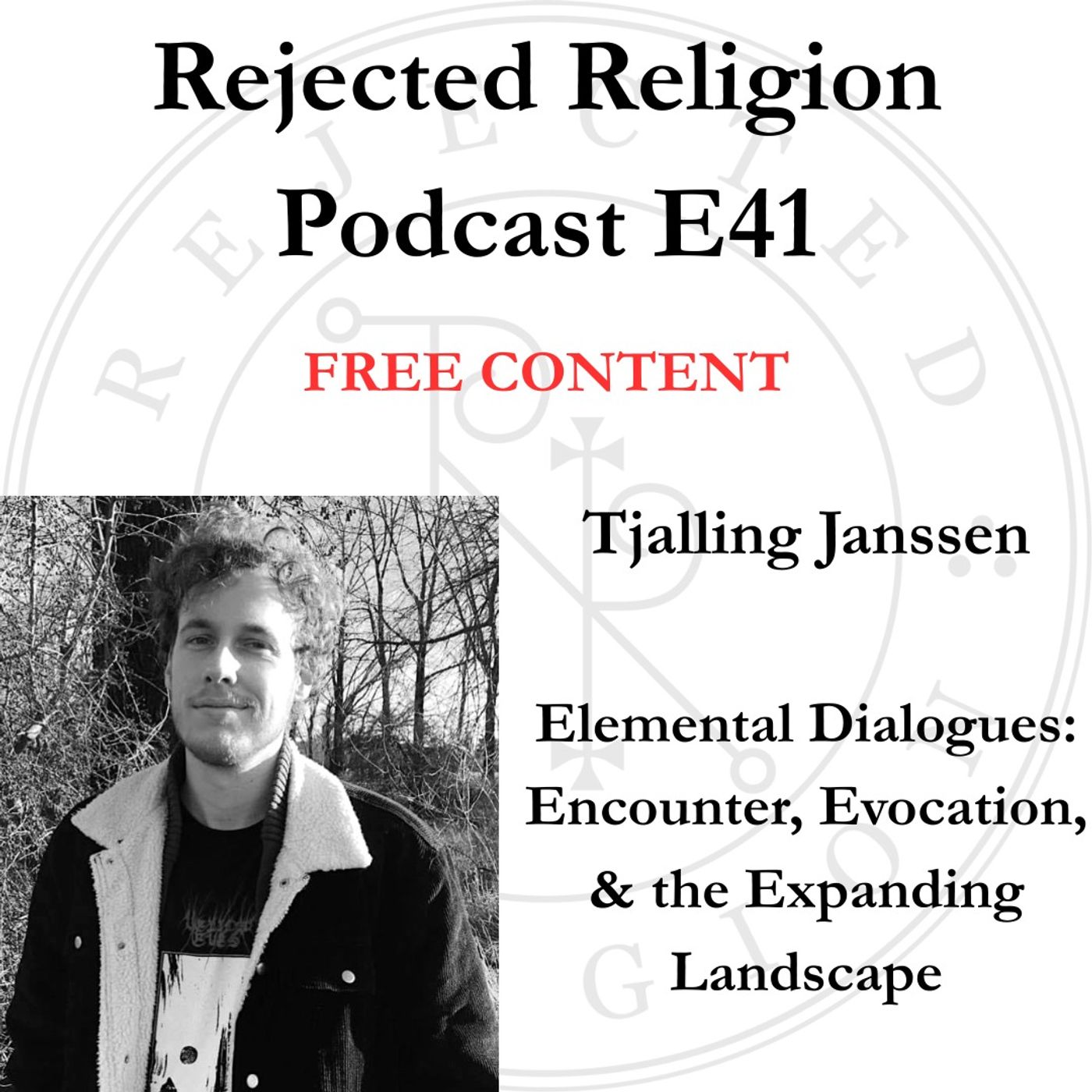
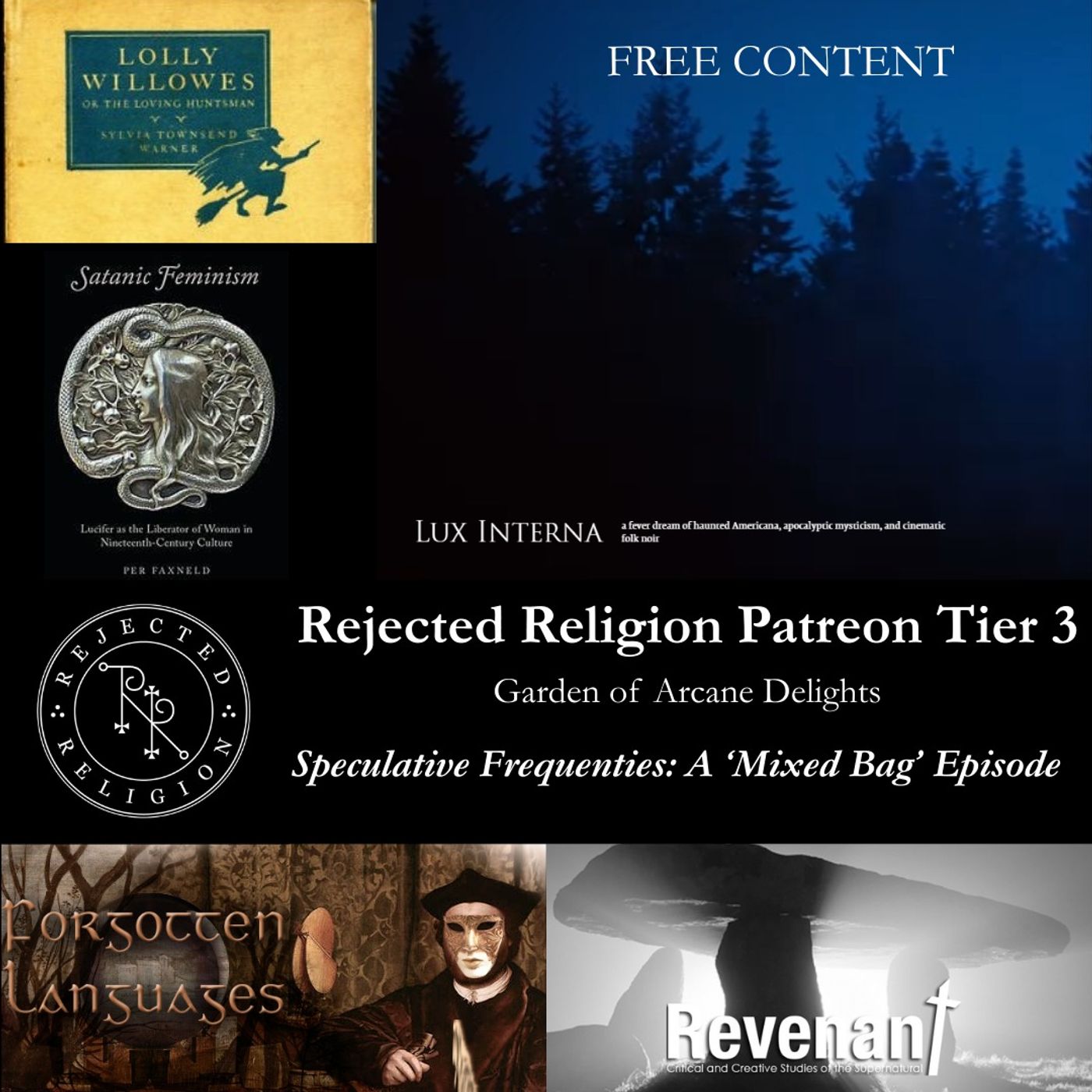
![Replay [Edited] - Esoteric Crossroads: Chaos Magick w/ Dr. Isis M. Kalmbacher & Frater Fuchs -June 2025 Replay [Edited] - Esoteric Crossroads: Chaos Magick w/ Dr. Isis M. Kalmbacher & Frater Fuchs -June 2025](https://image.simplecastcdn.com/images/7870e8a1-fc75-446c-b7de-d911349dc8b8/246fc5ce-0a26-4531-ac99-97c4222d43a3/3000x3000/esoteric-20crossroads-20scholars-20meet-20practitioners.jpg?aid=rss_feed)
![Replay [Edited] Esoteric Crossroads: Initiatory Wicca w/ Judith Noble & Rufus Harrington Replay [Edited] Esoteric Crossroads: Initiatory Wicca w/ Judith Noble & Rufus Harrington](https://image.simplecastcdn.com/images/7870e8a1-fc75-446c-b7de-d911349dc8b8/7bfb54b3-c389-496f-bbb9-32787417e167/3000x3000/esoteric-20crossroads-20scholars-20meet-20practitioners.jpg?aid=rss_feed)
